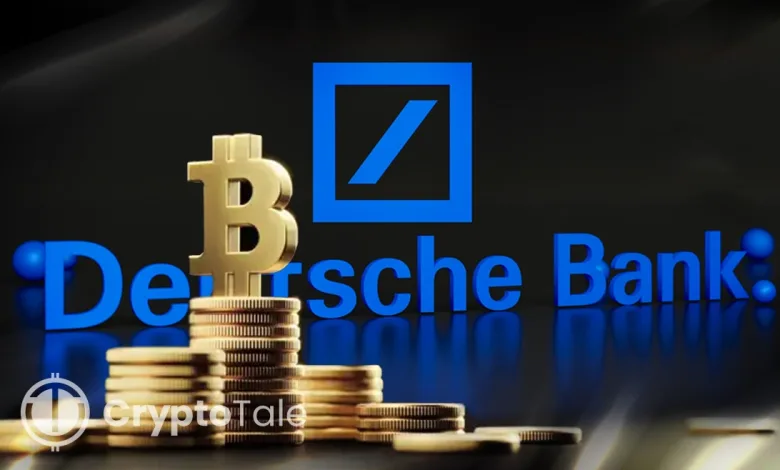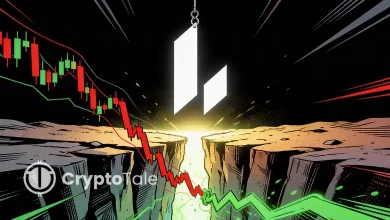Bitcoin Volatility Drops as Adoption and Regulation Increase

- Bitcoin’s volatility has declined to historic lows despite a 75% price surge since November.
- Over $50 billion has flowed into U.S. Bitcoin ETFs since 2024, boosting market stability.
- Deutsche Bank says adoption growth and regulation are lowering Bitcoin’s risk profile.
According to a new report released by Deutsche Bank, the volatility of Bitcoin is likely to decrease further as adoption rises in both institutional and retail segments, alongside government regulations. Based on the analysis, the world’s largest cryptocurrency has entered a more stable period, supported by increasing use of applications, greater liquidity, and more positive regulatory developments.
Bitcoin’s price has surpassed the $123,000 mark recently, a rise of 75% since mid-November, along with lower price volatility compared to the previous predictions. The report stated that the continued modest decline in volatility is indicative of a maturing market structure. As a result, Bitcoin is moving away from its earlier image as a speculative asset and becoming more aligned with long-term investment portfolios.
Institutional Inflows and New Legislation Boost Confidence
Furthermore, Deutsche Bank identified strong institutional inflows as a primary factor behind the reduction in volatility. After the approval of spot Bitcoin exchange-traded funds (ETFs) in early 2024, capital from traditional financial institutions has flowed into the market at a record pace. These ETFs raised $35 billion last year and surpassed $50 billion by mid-2025. With large-scale investors starting to show interest, one major fund, IBIT, has already amassed over $80 billion in assets under management.
According to the researchers, this steady influx of capital has provided Bitcoin with increased liquidity, narrowing its trading range and supporting price stability. They also noted that regulatory clarity is helping to bolster investor confidence. In the U.S. Congress, recent events, such as the upcoming votes on the CLARITY Act and the GENIUS Act, are creating a clearer legal environment for digital assets. The discussion of these bills during “Crypto Week” in Washington aims to establish more transparent legal frameworks for digital assets and stablecoins.
Policymakers are increasingly accepting these bills as they aim to formalize market frameworks and regulate stablecoins. Deutsche Bank has observed that regulatory certainty is a key factor in attracting long-term capital, even among pension funds and sovereign wealth entities. With greater rule clarity, risk perceptions decline, and Bitcoin becomes a more practical alternative for strategic asset allocation.
Macro Trends and De-Dollarization Strengthen Bitcoin’s Position
The report further associated Bitcoin’s evolving market profile with existing macroeconomic issues worldwide. The escalation of geopolitical risk and persistent trade tensions has increased interest in decentralized assets. Specifically, the weakening of the U.S. dollar has encouraged investors to diversify into options such as Bitcoin.
According to Deutsche Bank, the dollar index has declined nearly 10% this year, a trend driven by rising deficits and monetary expansion. This environment has accelerated what the report described as a “de-dollarization” movement. Investors, seeking safe havens, are increasingly turning to digital assets to protect their capital amid uncertainty.
Analysts also observed that investors were becoming more long-term holders rather than short-term traders. As more diversified funds incorporate Bitcoin, the strategic asset class gains importance in relation to the currency. This shift lowers speculation and boosts market stability during broader economic fluctuations.
Related: Standard Chartered Becomes First Global Bank to Launch Spot Bitcoin & Ether Trading
Technology Advances Improve Accessibility and Trust
Technological advances have also contributed to Bitcoin’s increasing stability. New solutions, such as the Lightning Network, are addressing scaling issues by offering faster and lower-cost transactions. Enhanced custody solutions have reduced risk for institutional holders, making the asset more secure and accessible.
With the combination of regulatory momentum and institutional adoption, these favorable infrastructure developments will continue to increase trust in Bitcoin’s long-term potential. Deutsche Bank also estimated that Bitcoin’s volatility will continue to decrease as more stakeholders adopt and incorporate it into the financial sector, thereby boosting its potential as a global investment.




